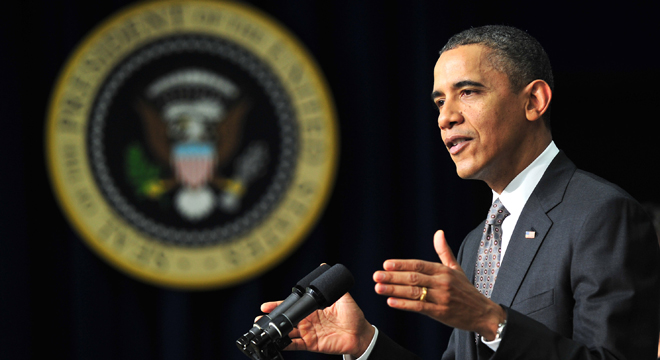President Obama signed a controversial defense funding bill sent to him by Congress, but did so with “reservations,” and in a signing statement gave his administration broad latitude to interpret and apply the bill as he sees fit.
“Moving forward, my administration will interpret and implement the provisions described below in a manner that best preserves the flexibility on which our safety depends and upholds the values on which this country was founded,” Obama wrote.
The bill provides funding for the armed services, intelligence services and other components of the federal government devoted to national security. It also adds further financial sanctions on Iran. The President’s issue with the bill is not a fight over funding, but with policy issues contained within the legislation, specifically the treatment of terror suspects, and the authority it sought to remove from the executive.
In criticizing Congress, the President described the counterterrorism successes that that government has had over his administration, giving credit to the military and intelligence services. “Our success against al-Qa’ida and its affiliates and adherents has derived in significant measure from providing our counterterrorism professionals with the clarity and flexibility they need to adapt to changing circumstances and to utilize whichever authorities best protect the American people, and our accomplishments have respected the values that make our country an example for the world,” the statement read.
But, he argued, Congress has essentially disregarded the current policy despite its effectiveness.
Against that record of success, some in Congress continue to insist upon restricting the options available to our counterterrorism professionals and interfering with the very operations that have kept us safe. My Administration has consistently opposed such measures. Ultimately, I decided to sign this bill not only because of the critically important services it provides for our forces and their families and the national security programs it authorizes, but also because the Congress revised provisions that otherwise would have jeopardized the safety, security, and liberty of the American people. Moving forward, my Administration will interpret and implement the provisions described below in a manner that best preserves the flexibility on which our safety depends and upholds the values on which this country was founded.
The new law requires military detention for suspects determined to be al-Qa’ida or other affiliated terrorists. The president retains the authority to send suspects to civilian court, but not without certification from Congress.
“I want to clarify that my Administration will not authorize the indefinite military detention without trial of American citizens,” reads the President’s signing statement. “Indeed, I believe that doing so would break with our most important traditions and values as a Nation. My Administration will interpret section 1021 [the detainee provision] in a manner that ensures that any detention it authorizes complies with the Constitution, the laws of war, and all other applicable law.”
Human and civil rights organizations call those promises empty, saying that President Obama has memorialized into law an indefinite detention policy that was previously only asserted by his predecessor.
In a statement on Saturday, the American Civil Liberties Union said “President Obama’s action today is a blight on his legacy because he will forever be known as the president who signed indefinite detention without charge or trial into law. The statute is particularly dangerous because it has no temporal or geographic limitations, and can be used by this and future presidents to militarily detain people captured far from any battlefield.”






